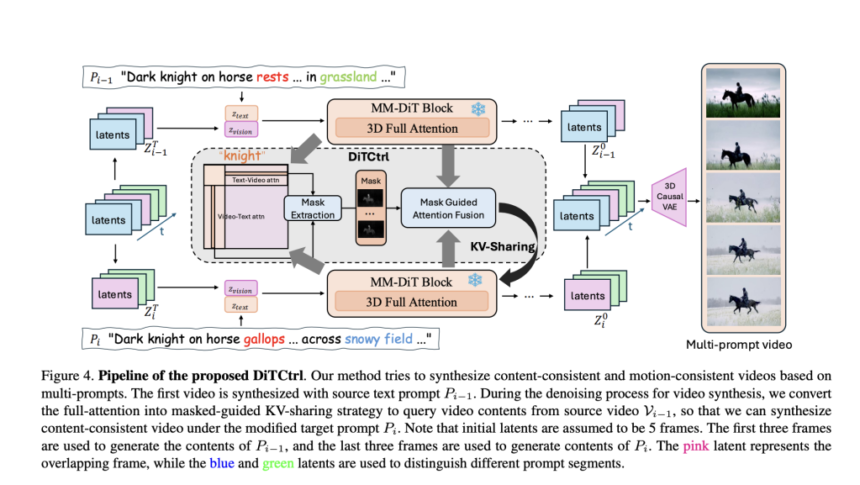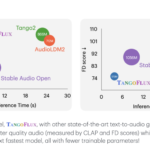

Generative AI has revolutionized video synthesis, producing high-quality content with minimal human intervention. Multimodal frameworks combine the strengths of generative adversarial networks (GANs), autoregressive models, and diffusion models to create high-quality, coherent, diverse videos efficiently. However, there is a constant struggle while deciding what part of the prompt, either text, audio or video, to pay attention to more. Moreover, efficiently handling different types of input data is crucial, yet it has proven to be a significant problem. To tackle these issues, researchers from MMLab, The Chinese University of Hong Kong, GVC Lab, Great Bay University, ARC Lab, Tencent PCG, and Tencent AI Lab have developed DiTCtrl, a multi-modal diffusion transformer, for multi-prompt video generation without requiring extensive tuning.
Traditionally, video generation heavily depended on autoregressive architectures for short video segments and constrained latent diffusion methods for higher-quality short video generation. As is evident, the efficiency of such methods always declines when video length is increased. These methods primarily focus on single prompt inputs; this makes it challenging to generate coherent videos from multi-prompt inputs. Moreover, significant fine-tuning is required, which leads to inefficiencies in time and computational resources. Therefore, a new method is needed to combat these issues of lack of fine attention mechanisms, decreased long video quality, and inability to process multimodal outputs simultaneously.
The proposed method, DiTCtrl, is equipped with dynamic attention control, tuning-free implementation, and multi-prompt compatibility. The key aspects of DiTCtrl are:
- Diffusion-Based Transformer Architecture: DiT architecture allows the model to handle multimodal inputs efficiently by integrating them at a latent level. This gives the model a better contextual understanding of inputs, ultimately giving better alignment.
- Fine-Grained Attention Control: This framework can adjust its attention dynamically, which allows it to focus on more critical parts of the prompt, generating coherent videos.
- Optimized Diffusion Process: Longer video generation requires a smooth and coherent transition between scenes. Optimized diffusion decreases inconsistencies across frames, promoting a seamless narrative without abrupt changes.
DiTCtrl has demonstrated state-of-the-art performance on standard video generation benchmarks. Significant improvements in video generation quality were made in terms of temporal coherence and prompt fidelity. DiTCtrl has produced superior output quality in qualitative tests compared to traditional methods. Users have reported smoother transitions and more consistent object motion in videos generated by DiTCtrl, especially when responding to multiple sequential prompts.
The paper deals with the challenges of tuning-free, multi-prompt, long-form video generation using a novel attention control mechanism, an advancement in video synthesis. In this regard, by using dynamic and tuning-free methodologies, this framework adds much better scalability and usability, raising the bar for the field. DiTCtrl, with its attention control modules and multi-modal compatibility, lays a strong foundation for generating high-quality and extended videos—a key impact in creative industries that rely on customizability and coherence. However, reliance on particular diffusion architectures may not make it easily adaptable to other generative paradigms. This research presents a scalable and efficient solution ready to take advancements in video synthesis to new levels and enable unprecedented degrees of video customization.
Check out the Paper. All credit for this research goes to the researchers of this project. Also, don’t forget to follow us on Twitter and join our Telegram Channel and LinkedIn Group. Don’t Forget to join our 60k+ ML SubReddit.
 FREE UPCOMING AI WEBINAR (JAN 15, 2025): Boost LLM Accuracy with Synthetic Data and Evaluation Intelligence–Join this webinar to gain actionable insights into boosting LLM model performance and accuracy while safeguarding data privacy.
FREE UPCOMING AI WEBINAR (JAN 15, 2025): Boost LLM Accuracy with Synthetic Data and Evaluation Intelligence–Join this webinar to gain actionable insights into boosting LLM model performance and accuracy while safeguarding data privacy.
The post DiTCtrl: A Training-Free Multi-Prompt Video Generation Method Under MM-DiT Architectures appeared first on MarkTechPost.






